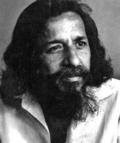Remembering John - Adoor Gopalakrishnan

It's been a long while since our beloved John Abraham left all of us. Any attempts to confine his exceptional genius, who left us in unusual circumstance in adjectives or clichés are bound to fail. John never had friends or foes in the extremes. If anyone claims otherwise, it would have to be treated with suspicion. If someone describes him as a prophet who belonged to an extraordinarily lofty plane, I would tend to agree.
Though older, he was three years junior to me at Pune Film Institute which he joined after resigning his job in L.I.C at Kumbhakonam, Tamil Nadu. Typically, first year students would be ignored as novices by their seniors in any educational institution. However, probably for his captivating personality, John attracted our attention and affection. There would always be a bunch of mates around the articulate John. Drama, Painting, Music, literature - be it anything, he had an uncommon grasp and enthusiasm. Sporting a playful smile he was a natural hitting punch line in any debate.
This was a period when all the students at the Institute were struck by the magical spell of Ritwik Ghatak, who was the vice-principal and Professor of Direction. I remember John's arrival at the institute with some fascination for the period. Naturally they got along quite well. I've heard people say Ghatak expected John to have the brightest future of all his students.
If anyone asks for the most important aspect of John's cinema, I would have to mention at the outset, their engrossing black humor. The protagonist riding a motorcycle by pedaling on the starter (Students, this way, 1972), milkman attempting to fool the cow to yield milk by propping up a calf with straws (Donkey in the Brahmin ghetto, 1977), towards the end in the movie, Cruelties of Cheriyachan (1979) the scene is titled "Ascent" with a long shot of the actor perched on top of a coconut tree, and in the same movie you might as well remember Cheriachan's mother narrate her story in monologue in the burial ground right after her death - like soul inside a body all these stood for a universal vision embodied in unique narrative techniques. Artists who cherished the dead and the living, the exciting and the lifeless with the same intensity of indulgence and affection are not to be found anywhere except John. The scene in the Brahmin Ghetto where the lid of a coffin is opened repeatedly revealing the dead body in a mortuary and the still born child in "To Mother" (1986) clearly underline the above.
His unbridled and uninhibited lifestyle and the art that sucked its blood and sweat were merged irretrievably and inevitably by destiny for sure. His life was like a puzzle in a surreal scenario where a theatrical enactment of tragedy rumored, forewarned, accepted and inexorably took place in the end. We realize that with a jolt now. How can we ever say that the scenes from his own life when he lay unrecognized in the
John was a compulsive traveler, without any belongings, mostly without even another pair of clothing. John can be anywhere-in conscious or unconscious state; inebriate or sober; in groups or alone. We were together when the only time John traveled abroad, to
The new pair of shoes that *
We were convinced that John was the most popular, famous and liked participant among us in this Italian city. He did not need to speak Italian to achieve this.
We were given a car to visit
"Standing here if a Christian bloke felt a bit cocky, you can't really blame him".
The journey's triumph and the serene hallow of fulfillment and satisfaction passed on his smile to me.
I understood later that Pessaro was a major reinforcement for John. He afterwards completed "To Mother". He spoke of each step in production with a lot of excitement. How many of them including Rossellini’s son Jill, John promised to come back with the new film? Everyone who cared for him including myself truly believed he had just entered a new phase of artistic endeavor. Unfortunately for Malayalam films, the thing called fate that some believe and others don’t did not let it happen.
Once after a long interval, John visited my home. He asked my daughter:
"Who asked you to grow up?"
I would like to ask him in return:
"Dear John, who asked you to die?"
* John Abraham: John was one of the major avant-garde directors in Malayalam cinema. With only four films to his credit he had a major impact on the medium. He had an enigmatic persona who defied all the conventional norms of social codes. Even his death had a stamp of his world vision and seemed to invoke a black humor on society's conducts upon celebrity death. He fell off a multi-storey building and was kept in the mortuary for days before being identified.
*
This is a original translation work in English by Rajesh from Adoor Gopalakrishnan Book: Cinema, Literature and Life written in Malayalam and the original excerpt can be seen on his Blog
Ps: If anyone wants a copy of John Abraham's films, please send me an email or leave a comment, I will try sending you a copy.



Comments
Interesting read. Do extend the favour to me. Do I have to send you my address? :)
Anuj
I found this article very rejuvenating.
And feel like knowing the enigmatic personality.
can you tell me where the books will be available?
it was realy interesting to read....keep on doing the same work.keep the spirt high
really loved the article. a master film maker talking about another of the same or a higher stature! have been waiting for something like this for a long while!!
wud really appreciate if u could send a copy to me!! my email id is sivan.pillai[a]gmail.com
-Priya
-Niranjan